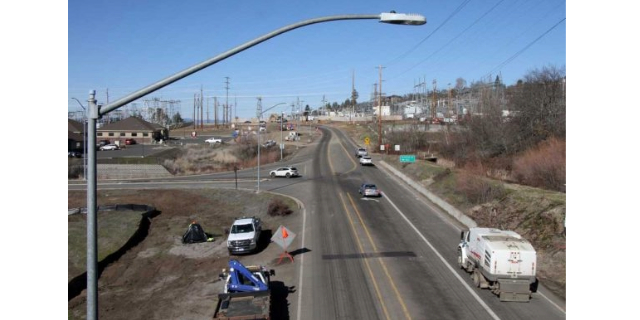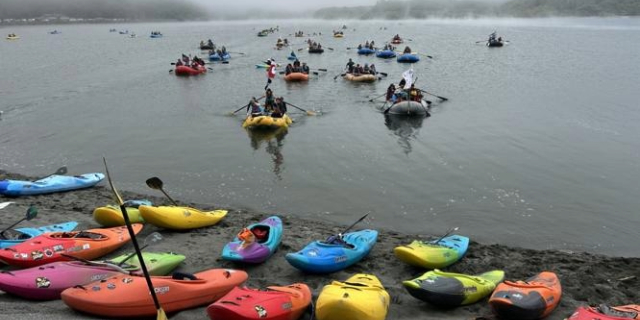Conservationists hope BLM’s Bear Grub timber sale stays shelved
Published 10:30 am Saturday, February 17, 2024

- Luke Ruediger, executive director of the conservation organization Applegate Siskiyou Alliance, stands amid trees marked with white paint that were previously slated to be sold and logged as part of the U.S. Bureau of Land Management's recently canceled Bear Grub timber sale. The photo was taken in February 2020 in the Wellington Wildlands area southwest of Jacksonville.
For Luke Ruediger, the recently canceled Bear Grub timber sale in the Applegate Valley is personal.
Trending
Ruediger, the executive director of the conservation organization Applegate Siskiyou Alliance, helped lead opposition to the now-halted sale, which involved the proposed logging of large trees on about 1,350 acres of land administered by the U.S. Bureau of Land Management southwest of Medford.
In particular, Ruediger objected to the logging of trees along trails he helped build.
“I was the crew boss on the East Applegate Ridge Trail,” Ruediger said. “I would rather not see it logged.”
Trending
The logging also would have taken place along the Jack-Ash Trail and in the Wellington Wildlands, a roadless area of more than 7,000 acres.
“The BLM proposed the Bear Grub Timber Sale in some of the most cherished wildlands and recreation areas in the Applegate Valley,” Ruediger wrote in a news release announcing that the BLM had notified the Alliance on Jan. 26 that the agency “wishes to reconsider” its Dec. 28 decision to offer the timber sale.
The Alliance and the Klamath-Siskiyou Wildlands Center had appealed the decision to the Interior Board of Land Use Appeals, which has since vacated the BLM’s decision and remanded it back to the agency, at the request of the BLM, which hasn’t made known how it proceed with the logging, although it is proceeding with related fuels-reduction work involving small trees and brush on an additional 5,000 acres in the area.
“We are continuing to work on the Bear Grub Vegetation Management Project in order to address the critical need for forest health and wildfire fuels reduction work in the area,” the agency stated in a written statement released this week.
In addition to opposing logging near the trails, Ruediger and the Alliance also objected to BLM’s plan to log trees up to 36 inches in diameter in areas up to 4 acres in size and scattered across up to 30% of a given area, in the name of wildfire protection. He said the logged areas would have quickly become overgrown and a fire danger.
“In a matter of five years or 10 years, they turn into thickets of young, highly flammable growth,” he said. “Those big openings they create turn out to be the most problematic fuel loads.”
The agency contends that the logging would improve the forest’s ability to withstand wildfire and that the creation of breaks in the forest canopy would help halt the spread of fire from tree crown to tree crown. The BLM also warned that unprecedented Douglas fir mortality was adding fuel to the fire.
“Commercial timber harvest is an important tool to address forest health in southwest Oregon,” Lauren Brown, Ashland field manager for the agency, said in a June news release about the Bear Grub sale. “This work is critical for restoring forest health near some of our most at-risk communities.”
The BLM’s Dec. 28 decision to go forward with the now-canceled timber sale was issued under Brown’s signature:
“Thinning from commercial harvest serves to reduce wildfire risk by breaking up and reducing the canopy fuels,” Brown wrote in the decision. “In short, by spreading out the remaining tree canopies, crown fire is less able to roll uncontrolled across the forest. These are the large-scale wildfire events that most typically threaten life and property.”
The logging was scheduled to take place across dozens of scattered patches of forest, in an area about 18 miles end to end and 6 miles wide, southwest and southeast of Jacksonville. An associated project involving the removal of trees under 8 inches in diameter along with brush is going forward on about 5,000 acres in the same general area.
The BLM has been working on the logging and fuels-reduction projects for at least five years. An initial decision to go ahead in 2020 was protested, rescinded and revised, leading to the Dec. 28 decision to again go ahead until the agency’s recent decision to again rescind it.
The BLM has billed the project as “a plan to promote more resilient forests,” although opponents viewed it as a guise to log.
“The Bear Grub Vegetation Management Project is designed to develop large fire-tolerant trees and reduce the severity of wildfires,” the agency stated in its news release last June, adding that the protests delayed fuels-reduction work and that Douglas fir mortality in the area had compromised the integrity of some of the merchantable timber. Drought, insects and climate change are taking their toll on the trees.
More than 1,200 people commented on BLM’s plans, with nearly all of them requesting that the agency “protect and restore, rather than log and exploit,” according to George Sexton, conservation director of KS Wild.
“The BLM intends to remove large fire-resilient trees, log along popular hiking trails, downgrade hundreds of acres of old-growth forests and log within riparian reserves,” Sexton wrote in a statement posted to the KS Wild website.
“Only a few years ago there appeared to be a thaw in the longstanding cold war regarding the BLM timber program,” Sexton added. “The BLM’s determination to abandon real collaboration and restoration in a rush to meet artificial timber targets is unfortunate and ultimately counterproductive.”
In its appeal, KS Wild stressed the impacts of logging on habitat of the northern spotted owl, listed as threatened under the Endangered Species Act.
“A stay is needed because once forest canopy is removed in gap creation clearcuts those logging units will cease to be forests,” KS Wild stated in its appeal. “Once spotted owl habitat is downgraded and removed from the Late Successional Reserve land use allocation it will be lost for our lifetimes. Once logging roads and landings are constructed, impacts to soil resources will persist for decades.”
A biological opinion from the U.S. Fish and Wildlife Service last year stated that the Bear Grub logging units would be “likely to adversely affect” spotted owl home ranges in the area, according to the KS Wild appeal.
KS Wild opposed only the logging of the 1,350 acres and didn’t oppose the fuels-reduction work on the 5,000 acres. Ruediger, of the Alliance, said most people opposed that logging, known as commercial logging.
“By and large, what people are protesting is the commercial component,” he said.
It’s not clear if the BLM will retool its logging plans or abandon them. Kyle Sullivan, agency spokesman, said in a written response for comment that the agency was working on the project, though it wasn’t specific about logging the 1,350 acres:
“The exclusion of fire on the landscape has led to overly dense forests that need treatment to restore forest health,” according to the statement. “Projects like Bear Grub, which remove trees greater than 8 inches in diameter through commercial treatments, are important to our forest resilience efforts.”
The statement said future updates would be posted to the agency’s planning website, bit.ly/4bJ5tUQ.
Ruediger hopes the timber sale stays canceled.
“We’d hate to have this controversy all over again,” he said.









